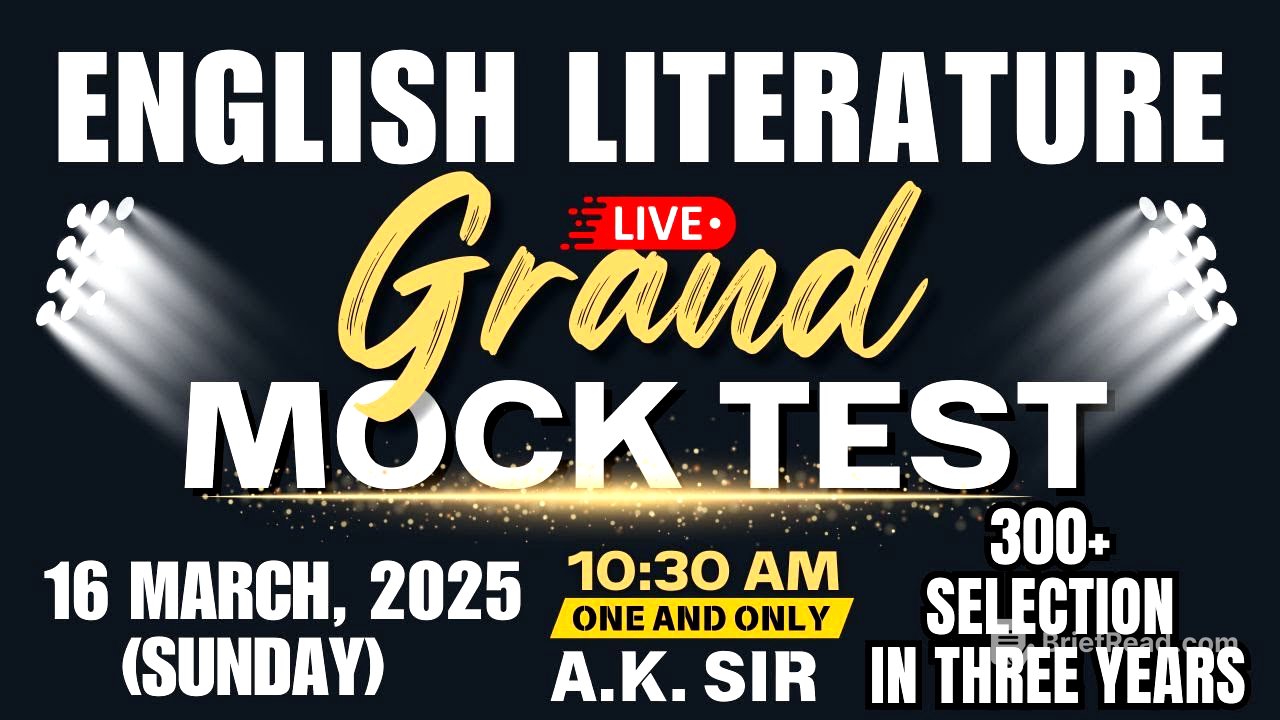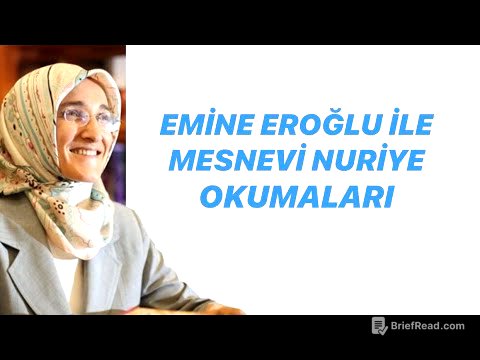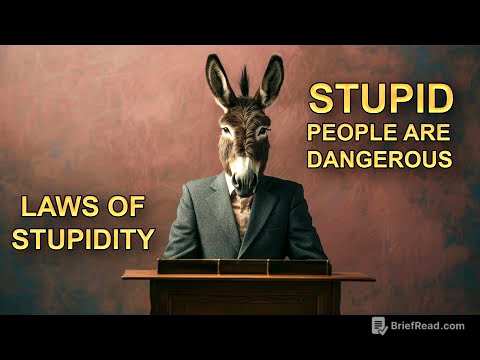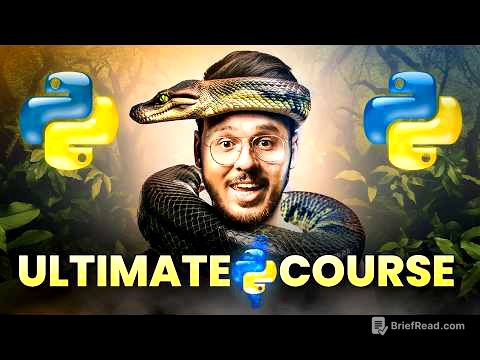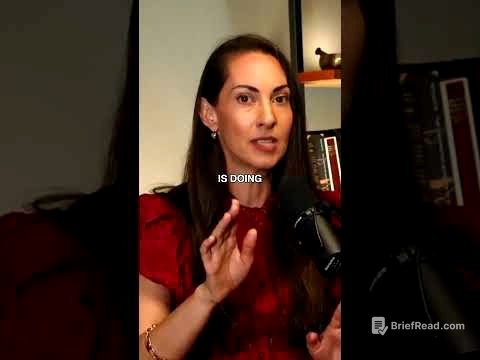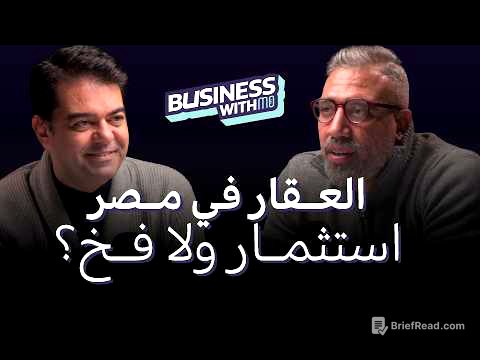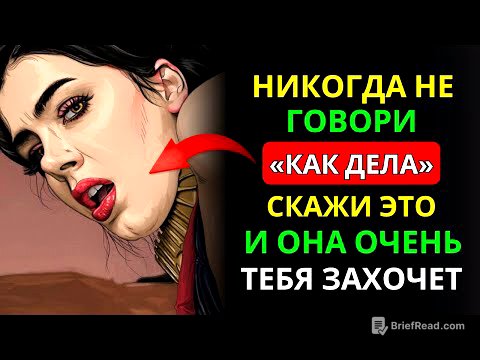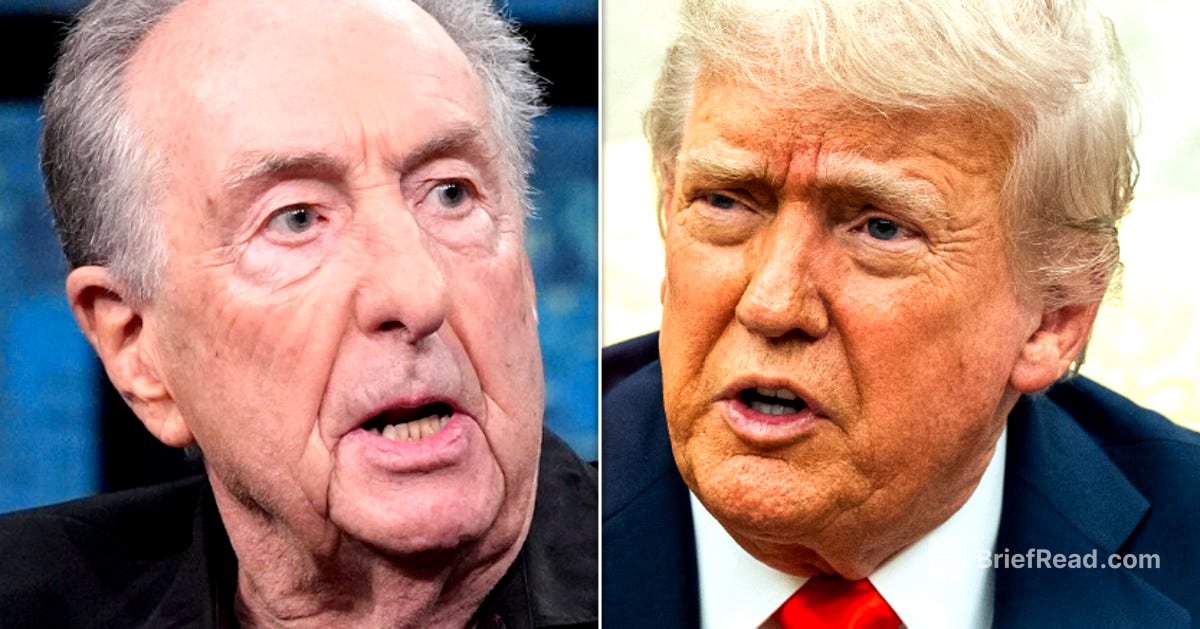TLDR;
This video presents a live grand mock test consisting of 100 questions divided into four parts, each containing 25 questions. The test covers various aspects of English literature and linguistics, including identifying authors, literary works, characters, and linguistic concepts. The session also includes explanations and discussions of the answers, with a focus on key details and hints to help participants improve their understanding and test-taking strategies.
- The test includes questions on identifying authors, literary works, and characters.
- Linguistic concepts, such as phonetics and morphemes, are also tested.
- The session provides explanations and discussions of the answers.
Introduction [0:52]
The session begins with greetings and instructions for the participants. It is emphasized that this is a mock test to prepare for the grand finale. The test consists of 100 questions divided into four parts. Participants are advised to have a notebook and pen to write down their answers and scores. The UGC achievers who cleared NET will be honored.
Questions 1-25 [6:42]
The first question asks in which work the famous line "hope springs eternal in the human breast" appears, with the correct answer being Alexander Pope's "Essay on Man." The second question asks to identify the author who brought "philosophy out of the closets and libraries, schools and colleges, to dwell in clubs and assemblies, at tea-tables, and coffee houses," with the correct answer being Joseph Addison. The third question asks who called Shakespeare "the sweet swan of Avon," "Star of Poets," and "Soul of the Age," with the correct answer being Ben Jonson. The fourth question asks which work begins with the line "Of Man's First Disobedience, and the Fruit Of that Forbidden Tree," with the correct answer being "Paradise Lost." The fifth question asks which book of "Paradise Lost" best describes the Golden Age, with the correct answer being Book Two. The sixth question asks who wrote the novel "Pamela, or Virtue Rewarded," with the correct answer being Samuel Richardson. The seventh question asks which of the Nobel Prize facts is incorrect, with the correct answer being Rabindranath Tagore's Geetanjali in 1913. The eighth question asks who said, "I write plays with a deliberate purpose to convert the nation to my opinion," with the correct answer being George Bernard Shaw. The ninth question asks what is common between John Dryden, William Wordsworth, Robert Burns, and Lord Tennyson, with the correct answer being that they are all Poet Laureates. The tenth question asks who is the protagonist of the novel "Wuthering Heights," with the correct answer being Heathcliff. The eleventh question asks what sound is produced by lowering the velum to allow free airflow through the nasal and oral passages, with the correct answer being a nasal sound. The twelfth question asks what term refers to the use of words with hissing and melodious sounds, with the correct answer being euphony. The thirteenth question asks what words having an internal structure consisting of smaller units are known as, with the correct answer being morphemes. The fourteenth question asks what is a characteristic of a voiceless sound, with the correct answer being no vibration in the vocal cords. The fifteenth question asks what is a characteristic of a free morpheme, with the correct answer being that it can stand alone as a word. The sixteenth question asks which of the following pairs is not correct, with the correct answer being "The Apple Cart" written by George Bernard Shaw. The seventeenth question asks which poem contains the lines "Hail to thee, blithe Spirit! / Bird thou never wert," with the correct answer being "To a Skylark" by Percy Bysshe Shelley. The eighteenth question asks what the novel "Clarissa" is subtitled, with the correct answer being "The History of a Young Lady." The nineteenth question is a matching question. The twentieth question asks what imagery is. The twenty-first question is about John Donne. The twenty-second question is a matching question. The twenty-third question asks which of the following is known for realism and psychological insight, with the correct answer being George Eliot. The twenty-fourth question asks what term is defined by Keats as being capable of being in uncertainties, mysteries, and doubts, with the correct answer being negative capability.
Questions 26-50 [52:35]
The twenty-sixth question asks what figure of speech is used in the line "O solitude! where are the charms / That sages have seen in thy face?", with the correct answer being apostrophe. The twenty-seventh question asks what novel is set on "Glowpaper," with the correct answer being "Novel on Yellow Paper" by Stevie Smith. The twenty-eighth question asks which novel contains the lines "Na you haven't met the right man and never shall meet the right men while you h lines acr," with the correct answer being "Sons and Lovers" by D.H. Lawrence. The twenty-ninth question asks which novel by E.M. Forster is set against the backdrop of the British Raj and the Indian Independence Movement in 1920, with the correct answer being "A Passage to India." The thirtieth question asks which poem is based on the Titanomachia and tales of the disappearance of the Titans after their fall to the Olympians, with the correct answer being "Hyperion" by John Keats. The thirty-first question asks which poem contains the lines "Sweet theme run softly, till I end the song," with the correct answer being "The Waste Land" by T.S. Eliot. The thirty-second question asks which of Tagore's novels has been referred to in the context of comparing it to Tolstoy's "War and Peace," with the correct answer being "Gora." The thirty-third question asks which of the following statements is incorrect regarding Khushwant Singh's "Train to Pakistan," with the correct answer being that the novel was published in 1956. The thirty-fourth question asks what is parodied in Alexander Pope's "The Rape of the Lock," with the correct answer being heroic epics. The thirty-fifth question asks what is the defining characteristic of Samuel Richardson's writing style, with the correct answer being emotionally detailed letters. The thirty-sixth question asks who says "Liberty, the Soul of Life, shall reign, / Shall throb in every pulse and vein," with the correct answer being Samuel Taylor Coleridge. The thirty-seventh question asks who coined the term "Esemplastic," with the correct answer being Samuel Taylor Coleridge. The thirty-eighth question asks which Robert Browning poem was published under the title "Madhouse Cells," with the correct answer being "Porphyria's Lover." The thirty-ninth question asks who is acknowledged as the founder of modern linguistics, with the correct answer being Ferdinand de Saussure. The fortieth question asks which famous Victorian novel satirizes the heroine's plight, with the correct answer being "Jude the Obscure" by Thomas Hardy. The forty-first question asks what is a distinctive requirement for the articulation of consonant sounds, with the correct answer being complete and partial closure of the air passage. The forty-second question asks which critic devised the "touchstone method," with the correct answer being Matthew Arnold. The forty-third question asks who wrote "The Vision of Judgement," with the correct answer being Lord Byron. The forty-fourth question asks who called Harold Pinter's early plays "comedies of menace," with the correct answer being Irving Wardle. The forty-fifth question asks which century the Augustan Age in English Literature follows, with the correct answer being the 18th century. The forty-sixth question asks what "Hard Times" by Charles Dickens is a bitter satire on, with the correct answer being the effects of the Industrial Revolution. The forty-seventh question asks what a portmanteau word is. The forty-eighth question asks which novel is set in a small village called Thul Samvan in Maharashtra, with the main protagonist being Leela, with the correct answer being "Village by the Sea" by Anita Desai. The forty-ninth question asks which of the following is correct regarding the Sahitya Akademi Awards.
Questions 51-75 [1:22:03]
The fiftieth question asks to find the incorrect statement about "Waiting for Godot," with the correct answer being that it is a verse tragedy. The fifty-first question asks who Joseph Addison called the "miracle of the present," with the correct answer being Isaac Newton. The fifty-second question asks about the Licensing Act of 1737, with the correct answer being that it was enacted to control and censor what was being said about the British government through the theater. The fifty-third question asks what is the full title of Fielding's novel "Tom Jones," with the correct answer being "The History of Tom Jones, a Foundling." The fifty-fourth question asks which periodical essay was started by Joseph Addison and Richard Steele, with the correct answer being "The Spectator." The fifty-fifth question asks in which year Charles Dickens' famous novel "A Tale of Two Cities" was published, with the correct answer being 1859. The fifty-sixth question asks which of T.S. Eliot's poems contains the line "Ash Wednesday," with the correct answer being "Ash Wednesday." The fifty-seventh question asks in which year James Joyce's "Ulysses" was published, with the correct answer being 1922. The fifty-eighth question asks in which year Joseph Conrad's novel "Heart of Darkness" was published, with the correct answer being 1899. The fifty-ninth question asks which of the following is not a work by William Blake, with the correct answer being "Songs of Marriage." The sixtieth question asks which characters are in Samuel Beckett's "Waiting for Godot," with the correct answer being Vladimir, Estragon, Pozzo, and Lucky. The sixty-first question asks what "Animal Farm" is a satire on, with the correct answer being totalitarianism. The sixty-second question asks what a conceit is in metaphysical poetry. The sixty-third question asks what Jane Austen's novels show, with the correct answer being affirmation of the virtues of restraint and self-control. The sixty-fourth question asks which novel features the character Pasan Adam, with the correct answer being "Joseph Andrews" by Henry Fielding. The sixty-fifth question asks which novel Charlotte Brontë wrote first, with the correct answer being "The Professor." The sixty-sixth question asks which novel "The Last Man" was written by, with the correct answer being Mary Shelley. The sixty-seventh question asks who wrote the gothic novel "The Monk," with the correct answer being Matthew Lewis. The sixty-eighth question asks which work contains the line "Beauty is truth, truth beauty," with the correct answer being "Ode on a Grecian Urn" by John Keats. The sixty-ninth question asks who represents the view of the moderns in "The Battle of the Books," with the correct answer being the spider. The seventieth question asks what "Bleak House" is a satire on, with the correct answer being the abuse of the old court. The seventy-first question asks what is the name of Ramaswamy's wife in Raja Rao's "The Serpent and the Rope," with the correct answer being Madeleine.
Questions 76-100 [1:59:36]
The seventy-second question asks which part of the speech mechanism is also known as the voice box, with the correct answer being the larynx. The seventy-third question asks to find the incorrect statement, with the correct answer being that a sign has two main forms according to Chomsky. The seventy-fourth question asks what accent refers to, with the correct answer being pronunciation. The seventy-fifth question asks what is the primary function of the vocal cords in speech production, with the correct answer being producing voice sounds. The seventy-sixth question asks what Salman Rushdie's "Haroun and the Sea of Stories" is, with the correct answer being a novel for children. The seventy-seventh question asks who recommended R.K. Narayan's first novel to a publisher in England, with the correct answer being Graham Greene. The seventy-eighth question asks who wrote the introduction to the English translation of Tagore's "Gitanjali," with the correct answer being William Butler Yeats. The seventy-ninth question asks which of the following is not a work by Graham Greene, with the correct answer being "The Heart of the Matter." The eightieth question asks which author was awarded the Nobel Prize in 1983, with the correct answer being William Golding. The eighty-first question asks which of the following is not a work by George Orwell, with the correct answer being "Shooting an Elephant." The eighty-second question asks which feminist classic was written by Virginia Woolf, with the correct answer being "A Room of One's Own." The eighty-third question asks who is the narrator in Joseph Conrad's "Heart of Darkness," with the correct answer being Charles Marlow. The eighty-fourth question asks what the term "objective correlative" is related to, with the correct answer being T.S. Eliot. The eighty-fifth question asks which family is featured in E.M. Forster's "Howards End," with the correct answer being the Wilcox family. The eighty-sixth question asks which novel features Mrs. Dalloway, with the correct answer being "Mrs. Dalloway" by Virginia Woolf. The eighty-seventh question asks which book of poems was written by Thomas Hardy, with the correct answer being "Wessex Poems." The eighty-eighth question asks which novel features the character Maya Gautam, with the correct answer being "The Peacock Feather" by Anita Desai. The eighty-ninth question asks to find the incorrect statement, with the correct answer being that Harold Pinter is associated with the comedy of menace. The ninetieth question asks what the first English tragedy is, with the correct answer being "Gorboduc." The ninety-first question asks which play features the characters Mr. Whitefield and John Tanner, with the correct answer being "Man and Superman" by George Bernard Shaw. The ninety-second question asks which novel by D.H. Lawrence was first published in 1915, with the correct answer being "The Rainbow." The ninety-third question asks who coined the term "dismal science," with the correct answer being Thomas Carlyle. The ninety-fourth question asks who wrote "Adam Bede," with the correct answer being George Eliot. The ninety-fifth question asks what the subtitle of Charles Dickens' novel "Oliver Twist" is, with the correct answer being "The Parish Boy's Progress." The ninety-sixth question asks what figure of speech is used in the line "It was the best of times, it was the worst of times," with the correct answer being antithesis. The ninety-seventh question asks who wrote "Venus and Adonis," with the correct answer being William Shakespeare.
Conclusion [2:24:45]
The session concludes with participants calculating their scores and preparing to join a Zoom link for an awards ceremony.
